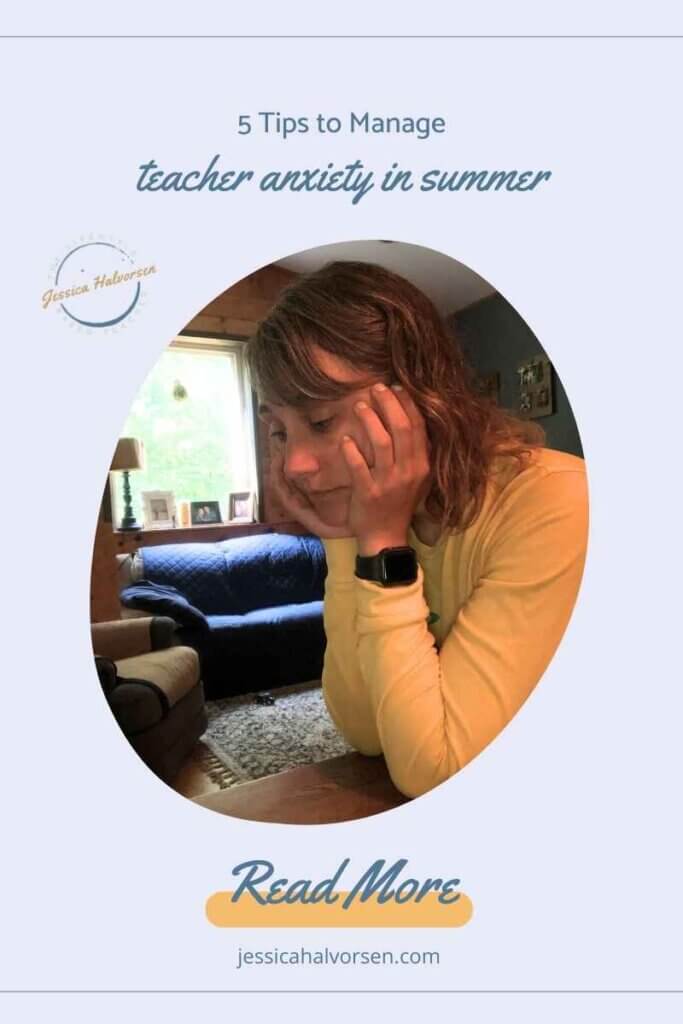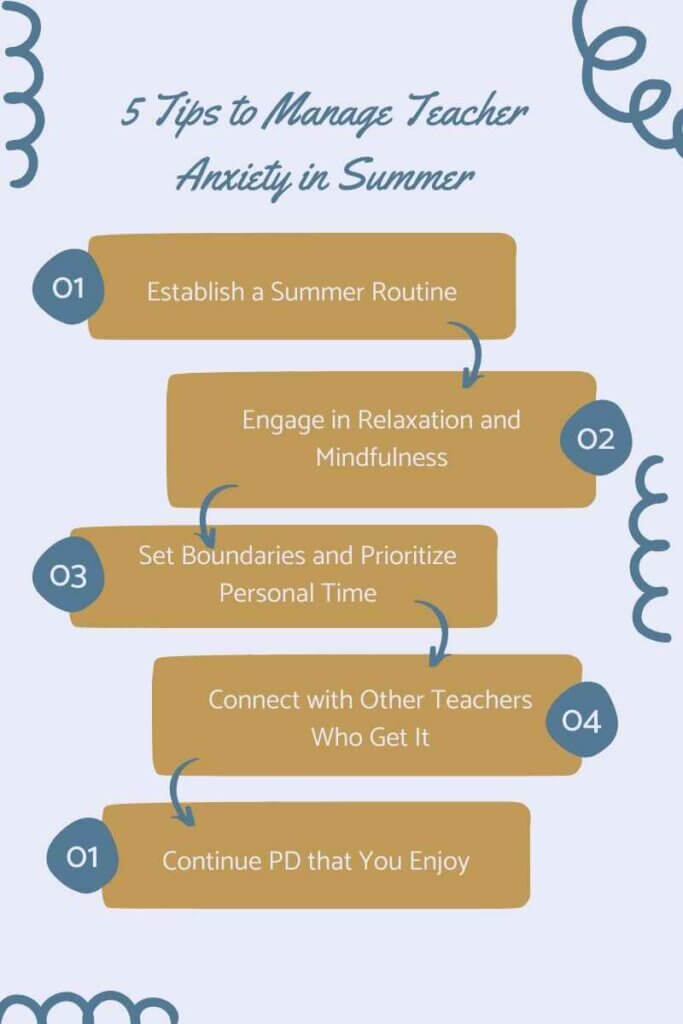Are you a teacher feeling the weight of summer stressors? You’re not alone. If you do a quick search, many teachers struggle with teacher anxiety in summer.
As much as summer break is eagerly anticipated, it can also bring educators new anxieties. Some teachers feel a loss of purpose in summer because they go from every minute of their day scheduled out during the year to having the time freedom to do what they want and not knowing how to spend the time. Others worry about planning for the next school year and the pressure of professional development; it’s easy for teacher anxiety to creep in during the break.
But fear not! In this article, I will share five expert-approved tips to help you manage teacher anxiety and maximize your well-deserved break. Whether finding balance, setting goals, or seeking support, I’ve covered you.
Because it’s my mission to help teachers manage stress and time, don’t wait to grab my FREE 5 Teacher Time Management Secrets to Leave Work at Work! Along with the tips in this article, this quick summer read will help relieve the anxiety of managing the tasks you must do as you prepare for the upcoming school year! Download your FREE copy here.
Then grab a cup of iced tea, take a deep breath, and dive into these strategies to help you recharge, relax, and return to the classroom with renewed confidence and enthusiasm. It’s time to make this summer break truly stress-free!
Understanding Teacher Anxiety during the Summer Break
Teaching can be incredibly rewarding but also comes with its fair share of stress and pressure. During the school year, teachers are constantly managing the needs of their students, juggling lesson plans, grading assignments, and dealing with various challenges that arise in the classroom.
While the summer break offers some respite from these day-to-day responsibilities, it can also bring about different stress. Many teachers aren’t sure what to do with the extra free time, worry about the next school year, question whether they have done enough to prepare, and feel pressure to improve their teaching skills constantly. This anxiety can take away from the much-needed rest and relaxation the break should provide.

Common Stressors for Teachers during the Summer Break
During the summer break, teachers may face a variety of stressors that contribute to their anxiety.
→ Spending time differently can be a stressor for many teachers. During the school year, you are constantly busy, and everything is scheduled. In summer, the lack of structure can bring anxiety. It can be frustrating when time is filled with tasks and activities that don’t bring joy.
→ Another common stressor is the pressure to plan for the upcoming school year. As teachers, we want to provide the best education for our students, and that often means spending time during the break developing new lesson plans, researching teaching strategies, and finding resources to enhance our curriculum.
→ Finally, the expectation to engage in professional development can also be a source of anxiety. Teachers are often encouraged to attend workshops, conferences, or courses to further their knowledge and skills, but finding the time and resources during the break can be challenging.
The Importance of Self-Care for Managing Teacher Anxiety in Summer
Before diving into the tips for managing teacher anxiety, it’s important to emphasize the significance of self-care. As teachers, we are often so focused on caring for others that we neglect our own well-being.
However, taking care of ourselves is essential for managing anxiety and stress. Self-care can come in many forms, whether engaging in activities that bring us joy, practicing mindfulness and relaxation techniques, or simply setting aside time for rest and rejuvenation.
By prioritizing self-care, we can better equip ourselves to handle the challenges that come our way and approach the next school year with a refreshed mindset.
Tip 1: Establishing a Summer Routine and Schedule
While the break is a time for relaxation and flexibility, having some structure can help alleviate anxiety. Start by setting a consistent wake-up time and bedtime to maintain a sense of regularity. Plan out your days, incorporating activities that bring you joy, such as hobbies, exercise, or spending time with loved ones.
Additionally, allocate specific professional development and planning time so you can address those responsibilities without feeling overwhelmed. Creating a routine can balance productivity and relaxation, ensuring you make the most of your summer break.
Tip 2: Engaging in Relaxation Techniques and Mindfulness Exercises
When teacher anxiety starts to creep in, it’s important to have tools and techniques to help calm your mind and body. Engaging in relaxation techniques and mindfulness exercises can be incredibly beneficial.
Consider incorporating deep breathing exercises, meditation, or yoga into your daily routine. These activities can help reduce stress, promote relaxation, and improve overall well-being.
Find what works best for you and make it a priority to engage in these activities regularly. Remember, your mental and emotional health is as important as your physical health.

Tip 3: Setting Boundaries and Prioritizing Personal Time
Teachers often give their all to our students and neglect our needs. However, setting boundaries and prioritizing personal time is crucial, especially during the summer break.
Learn to say no to commitments that don’t align with your self-care and well-being. Create boundaries around your time and clarify to others that you need space to recharge and relax.
Prioritize activities that bring you joy and fulfillment, whether reading a book, going for a walk, or indulging in a hobby. By setting boundaries and prioritizing personal time, you can better manage teacher anxiety and ensure that you care for yourself.
Tip 4: Connecting with Other Teachers and Seeking Support
One of the best ways to manage teacher anxiety is by connecting with other teachers and seeking support.
→ Reach out to colleagues who understand the unique challenges of the profession and can offer guidance and encouragement.
→ Join online communities or social media groups to connect with teachers worldwide and share your experiences. Sometimes, talking to someone who can relate can make a difference.
→ Additionally, consider seeking professional support if your anxiety becomes overwhelming. A therapist or counselor can provide valuable strategies and tools for managing stress and anxiety, ensuring you have the support you need to thrive personally and professionally.
Tip 5: Continuing Professional Development and Growth
While the summer break is a time for relaxation, it’s also an opportunity for professional development and growth. Engaging in activities that enhance your teaching skills and knowledge can help alleviate anxiety and boost your confidence. Consider attending virtual workshops or conferences, reading educational books or journals, or taking online courses.
Investing in your professional development improves your teaching abilities and shows dedication to your craft. This commitment to growth can help alleviate anxiety and give you a sense of purpose and fulfillment during the break.

Resources for Managing Teacher Anxiety in Summer
Managing teacher anxiety in summer can be challenging, but resources are available to help.
Online platforms, such as blogs, podcasts, and YouTube channels, offer valuable insights and tips from experienced educators. Here are just a few to help you know you’re not alone and give you a little comic relief:
Reddit Forum – Summer Anxiety (forum)
The Dark Side of a Teacher’s Sunny Summer Vacation (blog)
When Summer’s a Bummer: 50+ Things to Do if You’re a Teacher Who Dreads Summer Break (blog)
Teachers During Summer Break Be Like… (video)
If you’re a teacher dealing with anxiety this summer, peek at the 5 Teacher Time Management Secrets to Leave Work at Work. This free guide will help you establish the plan you need to leave work at work during the upcoming school year and spend your time the way you want!
The summer break should allow teachers to recharge, relax, and prepare for the next school year. However, it’s common for teacher anxiety to creep in during this period. By understanding the common stressors and implementing the five expert-approved tips we’ve shared in this article, you can effectively manage teacher anxiety and maximize your well-deserved break.
Establish a routine, engage in relaxation techniques, set boundaries, connect with other teachers, and continue your professional development. Remember to prioritize self-care and seek support when needed.
With these strategies, you can manage teacher anxiety in summer and recharge, relax, and return to the classroom with renewed confidence and enthusiasm. Make this summer break stress-free and set yourself up for a successful year.










